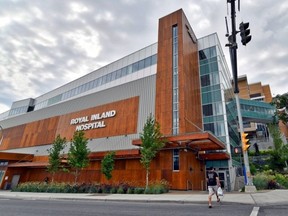Opinion: Nurses and doctors need adequate training on how to treat pain, withdrawal, and cravings in patients with opioid use disorder admitted to the hospital.

Article content
Last week, the Ministry of Health announced that it is creating a task force to address substance use occurring in British Columbia hospitals, prompted by reports of nurses from multiple health authorities being exposed to substance use during their shifts. Without a doubt, staff and patients should have the right to a safe environment while in hospital, which includes not being exposed to secondhand smoke.
Advertisement 2
Article content
As an addictions physician at Kelowna General Hospital, I commend Health Minister Adrian Dix for forming a task force to address this issue. One suggested intervention was that hospitals should have designated spaces for people with substance use disorders to use unregulated substances during their hospital stay.
Article content
Having these consumption spaces in all hospitals in the province, as initially proposed, is probably neither feasible nor an effective use of resources. However, this type of service is long overdue and needed in many larger hospitals in the province, where a larger cohort of inpatients would likely access this service if it were available. These spaces will prevent staff exposure and, at the same time, protect people who use drugs after their admission to the hospital. If an overdose event occurred in these spaces, there would be a rapid response, rather than these events occurring in a locked bathroom or other secret corners of a hospital.
While designated-use spaces are important, we can substantially decrease the need for such spaces by aggressively treating the withdrawal and pain of people with opioid use disorders while they are in the hospital. We are currently losing our way on this. Despite drug toxicity being the leading cause of death among people aged 10 to 59 in British Columbia (arguably the most pressing public health crisis today), addiction medicine remains under-educated in medical training.
Article content
Advertisement 3
Article content
Since the drug toxicity public health emergency was declared eight years ago, more than 14,000 people have died from toxic drugs in British Columbia. Substantial efforts have been made to improve access to life-saving opioid agonist treatment (OAT) in outpatient settings by increasing access to training. prescribe these medications to both doctors and nurses. However, there are significant educational gaps regarding best practices for inpatient treatment of substance use disorders. Most nurses and doctors receive little training during nursing school, medical school, and residency on how to treat pain, withdrawal, and cravings in patients with opioid use disorder who are admitted to the hospital.
Treatment typically consists of initiating treatment with opioid agonists and, when this is not sufficient, providing short-acting opioid medications at doses one order of magnitude higher than what is typically administered to patients receiving opioids for acute pain. .
There is an understandable reluctance to provide these short-acting medications. The fundamental approach to treating opioid use disorder contrasts with how we approach pain treatment, where we have taught healthcare providers to be stewards of opioid medications and use them sparingly to prevent dependence. My patients often tell me that they have a hard time asking for these medications, even when they are prescribed them, because they fear being labeled “medication seekers.” As a result of insufficient treatment in the hospital, patients often self-manage their own withdrawal or pain by using in the hospital.
Advertisement 4
Article content
Adequate education for nurses and doctors on the management of cravings, withdrawal, and pain of patients admitted to the hospital is essential to prevent patients from being discharged on their own initiative (such as leaving the hospital against the medical advice) and unregulated substance use in the hospital. While it is important to designate spaces for substance use, safety, and policy alignment among health authorities, education on the management of substance use disorders to prevent unregulated use should be the cornerstone of the government’s approach. provincial working group.
Dr. Leslie Lappalainen is a consultant in addiction medicine at Kelowna General Hospital and a clinical instructor at the University of BC.
Bookmark our website and support our journalism: Don’t miss the news you need to know – add VancouverSun.com and LaProvincia.com to your favorites and subscribe to our newsletters here.
You can also support our journalism by becoming a digital subscriber: for just $14 a month, you can get unlimited access to The Vancouver Sun, The Province, National Post and 13 other Canadian news sites. Support us by subscribing today: The Vancouver Sun | The province.
Article content
